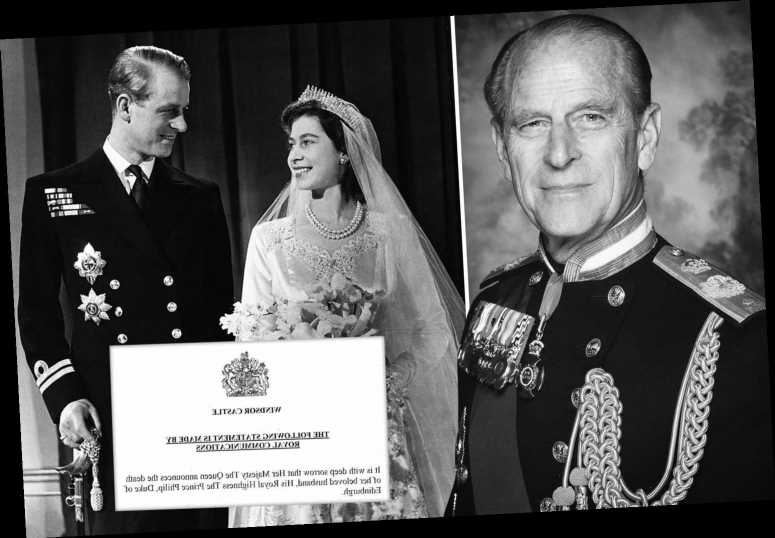WHAT an extraordinary life. What epic and exemplary service he gave to his Queen and country. What a character. What a joker.
For nearly seven decades Prince Philip was the rock behind the longest reign in the history of our monarchy, that vital thread in the fabric of Britain.
? Read our live blog for the very latest news on Prince Philip's death…
Our hearts, and those of our readers, go out today to Her Majesty — suffering the overwhelming grief of losing the man she has loved since she was 13 — and to the children, grandchildren and great-grandchildren who adored him too.
For the nation, and the Commonwealth, their marriage was a symbol of unwavering stability during 73 years of almost unimaginable societal and technological change.
We owe them both a debt of gratitude for that.
But when the Queen called Philip her “strength and stay” it wasn’t just down to his love and devotion.
Crucially, he made her laugh . . . his subversive, deadpan wit and reliably un-PC one-liners puncturing for her the po-faced solemnity of Royal rituals.
We may never know if he genuinely asked his wife, after all the pomp and pageantry of her 1953 coronation, “Where did you get that hat?” But it would have been typical.
Given how long his public role lasted it is easy to forget that Philip had endured a normal lifetime’s tragedy and upheaval before he even turned 16.
And that years before his wife ascended to the throne he was a genuine World War Two Navy hero decorated for bravery.
From the start of her monumental reign, though, his steadfast dedication to his wife, his duty and the countless charities he championed was immense.
And his work rate was simply staggering.
Thirteen Prime Ministers and 13 US Presidents came and went as the Duke travelled the world alongside the Queen, supporting her and representing our nation on 637 overseas tours.
He carried out 22,219 solo engagements.
UNFAILINGLY LOYAL
He did so without complaint despite considerable trauma in his own life: His uncle’s murder by the IRA, Princess Diana’s death, the divorces of three of his four children and finally his grandson Harry’s bitter departure from Royal duties.
Philip was of course an unfailingly loyal confidante and support for Her Majesty. Without him her role would have been intolerably lonely.
But, perhaps at odds with his image, he was also a moderniser of the Royal household from the very start.
Indeed he became the glue holding it together and maintaining the institution’s public popularity.
The sea of flowers yesterday outside Buckingham Palace — and the determined well-wishers turning out in defiance of Covid restrictions — are poignant reminders of how well he succeeded.
Some will no doubt have been among the millions who have Philip to thank for the chances given to them as young people by the Duke of Edinburgh Awards which he launched back in 1956.
The Queen’s husband could have been a colourless foil for her. How much greyer our lives would then have been.
Instead, Philip provided endless mirth — and a reliable supply of stories for The Sun.
His infectious humour and straight-faced gags were sometimes wince-making and often laugh-out-loud funny.
He was accused of racism and sexism. To most people he was simply, well, unbothered by political correctness.
The Sun has often labelled them “gaffes”. But we doubt they were ever accidental. Or that Philip cared a jot if they caused offence.
UTTERLY CHARMED
He once asked a Scottish driving instructor how he kept “the natives off the booze long enough to get them through the test”.
He dismissed Prince Andrew and Fergie’s Sunninghill Park mansion as resembling “a tart’s bedroom”.
He told dignitaries in Canada: “I declare this thing open, whatever it is.”
The Duke was blunt. He didn’t suffer fools at all, let alone gladly. But he was never short of a quip and we were never short of a laugh.
Most people who met him were utterly charmed — and his staff loved him.
“I was always struck by his obvious joy at life,” Archbishop of Canterbury Justin Welby said yesterday.
“And his ability to communicate to people from every background and walk of life.”
That was our experience too.
Philip found time to indulge his niche obsessions — UFOs, for example — and his passions such as carriage-driving. But duty came first.
And he had a simple explanation for spending so long tirelessly toiling in the Queen’s shadow: “It’s the work we do for the positions we occupy.”
It remains a vital lesson for all the young Royals.
They did not choose that life. But it does have enormous privileges which come with a trade-off: To work uncomplainingly on behalf of the nation which provides them.
Philip, for all that he was a wonderful character, embodied that dedication to duty.
Rest in peace, sir . . . with Britain’s thanks for a lifetime of service.
Source: Read Full Article




















